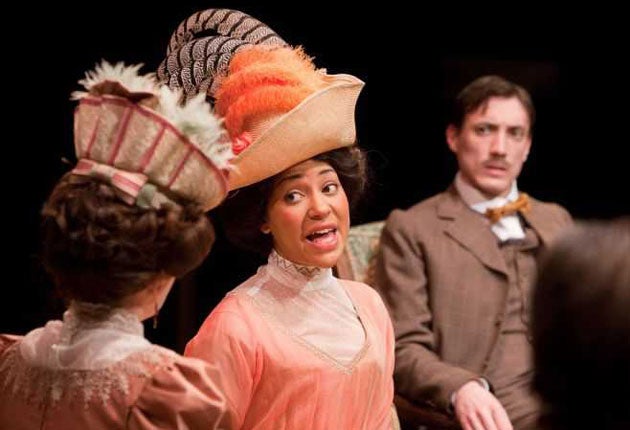Pygmalion: The original and best cockney rebel
As two new productions of Pygmalion hit the stage, Michael Coveney wonders why we can't get enough of Eliza Doolittle

Your support helps us to tell the story
From reproductive rights to climate change to Big Tech, The Independent is on the ground when the story is developing. Whether it's investigating the financials of Elon Musk's pro-Trump PAC or producing our latest documentary, 'The A Word', which shines a light on the American women fighting for reproductive rights, we know how important it is to parse out the facts from the messaging.
At such a critical moment in US history, we need reporters on the ground. Your donation allows us to keep sending journalists to speak to both sides of the story.
The Independent is trusted by Americans across the entire political spectrum. And unlike many other quality news outlets, we choose not to lock Americans out of our reporting and analysis with paywalls. We believe quality journalism should be available to everyone, paid for by those who can afford it.
Your support makes all the difference.Two new productions of George Bernard Shaw's imperishable high comedy Pygmalion in Manchester and Chichester will almost certainly be accompanied by surprise at how the play gets along very well without Eliza Doolittle singing "I Could Have Danced All Night" or her dustman dad bawling out "Get Me to the Church on Time".
Every time it's revived, Pygmalion emerges from the long shadow cast by its own musical adaptation, My Fair Lady, and is "rediscovered" as a timeless study of social manipulation, sexual cat-and-mouse and linguistic brilliance, despite its late Edwardian flavour and furnishings.
And because the play is about possession and independence in relationships, it never dates. "Think Educating Rita meets Pretty Woman" says the Royal Exchange's website, while the Chichester Festival Theatre – where Rupert Everett's Higgins takes on the Eliza of Honeysuckle Weeks – promises a provocative exploration of "sexual politics and class restrictions".
Pygmalion was a mythological king of Cyprus who fell in love with a statue of his own invention, Galatea. Shaw both exploits and subverts this myth to show the Higgins's transformed duchess of a flower girl fragmenting fiercely back into common humanity.
Everything about Pygmalion – and, to a lesser extent, My Fair Lady, which is brilliant, but saccharine (the play was good enough "with its own verbal music", said Shaw, resisting all offers to make a musical of it in his lifetime) – is marked with the pain of a complicated and unrequited love; in Shaw's case, his own for Mrs Patrick Campbell, the first, 49-year-old Eliza in 1914.
Higgins is a buttoned-up bachelor type, though it's unlikely that Mrs Pat's original Svengali, Herbert Beerbohm Tree, fully conveyed this on the first night at His Majesty's Theatre. Tree was cavalier with his lines and wooed Mrs Pat like Romeo, throwing a bunch of flowers at her as the curtain fell.
This interpretative liberty did not detract from the success of the play, which was tumultuous. When the poshed-up Eliza was asked, at the tea-party, if she was about to walk across the park and replied with, "Walk! Not bloody likely, I always take a taxi", the shocked silence was immediately followed by laughter timed at a full 75 seconds.
Shaw wrote extra scenes, including Eliza's triumphal transfiguration at the embassy ballroom, for the 1938 movie starring Leslie Howard and Wendy Hiller. These are often incorporated in modern stage productions, such as the National Theatre revival in 1992, when Leslie Howard's nephew, Alan Howard, was a memorably tortured Higgins opposite Frances Barber's sensual Eliza. That duo's playing of their last scene was the best I've seen. Howard's flicking airiness punctuated by Barber's catty squeals in a twisting skein of emotional confusion and bitter acceptance.
But the play renews its magical properties in every age. Alec McCowen and Diana Rigg reclaimed it for the Women's Lib generation in John Dexter's combative 1974 production, while, 10 years later, Peter O'Toole's Higgins in a Ray Cooney production, featuring a notably pretty Eliza in Jackie Smith-Wood, was a comic star turn – childish, bemused, bizarre – in the style of Will Hay and Stan Laurel.
Shaw's conviction that purity of speech is nothing to do with class, and that social improvement is no guarantee of happiness, never fails to strike home, though the Elizas of today – X Factor starlets, models and footballers' wives – probably have an even tougher route to intellectual maturity than a guttersnipe flower girl adopted for higher purposes on the whim of a suave impresario and overgrown mother's boy.
'Pygmalion', Royal Exchange, Manchester (0161 833 9833) to 19 June; Chichester Festival Theatre (01243 781312) 9 July to 27 August
Join our commenting forum
Join thought-provoking conversations, follow other Independent readers and see their replies
Comments